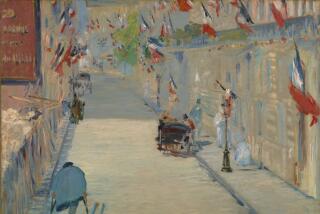Fleshed out
The title of Kate Christensen’s spry and engaging new novel has an irony that cuts deeper as the story progresses. If we start out with the impression, from the (fictional) New York Times obituary that opens the novel, that Oscar Feldman was an important American figurative painter and indeed a “great man,” by the last page we have countless reasons to doubt that assessment -- or at least to understand that his greatness was, as in the truism, bolstered by the number of great women who stood behind him.
Our journey of getting to know what Oscar Feldman was like as a painter and as a man (errant husband, arrogant brother, insatiable lover) parallels the journey taken by two young biographers who have simultaneously chosen to write a life of the artist. It’s a deft doubling on Christensen’s part, because it allows us to see Oscar’s significant survivors performing different sorts of dances around the two writers, who plumb the women for their stories, their interpretations, their secrets. Each biographer eventually finds himself drawn into and to some extent compromised by engagement with the extended Feldman family; certainly the art of biography does not come off glowingly in this fiction.
The family is itself quirky and fascinating. Christensen’s description of Feldman’s domestic complications reminds a reader of Louis Kahn’s multiple households, documented in the 2003 film “My Architect.” Feldman’s loyal wife, Abigail, bore him an autistic son, who lives with her in their home on Manhattan’s Upper West Side; and there are twin daughters whom the artist had with his longtime mistress Claire “Teddy” St. Cloud (who goes unmentioned in the obituary, which is what happened to the other family in Kahn’s life). The two women occasionally attended the same art events but did not speak, and at the novel’s opening the half-siblings have never met. Oscar’s lesbian sister Maxine is herself an accomplished abstract painter who always remained loyal to Abigail and hostile to Teddy.
The biographers, Henry Burke and Ralph Washington, make their inquisitive way into the various households and, inevitably, stir things up. We meet Teddy first: She offers a civilized lunch to Henry during which she begins the process of deflating any idealistic notions the biographer might have about his subject. As Teddy says, “the great man . . . was the biggest baby in all of history, that’s no secret: we all know how his women propped him up, me and his wife Abigail and sister Maxine and our daughters, not to mention every woman he met at an opening or on a train.” Oscar’s philandering might be said to have artistic justification: His sole subject throughout his career was the female nude, though he brought a force and boldness to his method that would, in the opinion of some, be an influence on painters such as Lucian Freud.
It makes sense that, in getting to know the women around Feldman, our sense of the artist is fleshed out. As this funny, complex group portrait evolves, we come to know some feisty and compelling women in their 70s; curiously, our interest in Oscar wanes as we come to appreciate the women he drew to him.
If lust was a powerful element of Oscar’s artistic drive, neither is it absent from the lives of these women. In the course of the novel, Teddy, spurred on by the new romance embarked on by her best friend Lila, eventually succumbs to the avid attentions of Oscar’s old lawyer; Maxine deals as evenly as she can with her attraction to her young assistant Katerina and has an emotional encounter with an ex-lover of some years earlier; and even Abigail, who has on the whole been viewed as the long-suffering, cheated-upon wife, will recall rather wistfully a passionate affair she once had when Oscar was still alive. One of Christensen’s great gifts in this novel is to bestow upon these characters the fullness of their desires while not sentimentalizing or glossing over their aches, pains and frustrations with aging.
Christensen also shades in the day-to-day details of these women’s lives, whether of Maxine’s intense hours of painting -- the author does a lovely job depicting the artist’s attempt to capture ideas, impressions, the feeling of life -- or Abigail’s care of Ethan, or Teddy preparing a nicely thought-out meal for her best friend. In fact, perhaps unsurprisingly in a novel with a female cast, food features significantly in this fiction: Christensen can go upmarket to a fussy, catered dinner at the posh apartment of Maxine’s dealer or lunch in a boutique Chelsea restaurant, but she seems as happy relishing a meeting in Maxine’s studio apartment over whiskey and tuna fish sandwiches.
Though in many ways essentially a wonderful group character study (which includes, to some degree, the two biographers), Christensen does provide several plot elements to keep the reader guessing. What is the secret bet made between Maxine and her brother whose revelation would be so significant? What will Abigail feel when she encounters Teddy at Maxine’s studio and, some weeks after that, meets one of Oscar and Teddy’s daughters for the first time? What betrayal of Oscar’s accounts for the terrible rift he had with his best friend of many decades?
The answers to these questions give Christensen room to explore in rich exchanges of dialogue the many things that interest her: the nature of abstract versus figurative painting, male privilege (and more simply, sexism) in the art world, and the complicated layers of family relations -- mothers mapping selves onto their children, siblings competing with one another, and fathers, at least in Oscar’s example, being allowed to remain above the fray while dedicating themselves to their work.
For ultimately if there is a moral in the life of an artist who was “prodigious, idiosyncratic, charismatic, possessing an intensely visceral gusto more than any other quality,” it might be to beware of selfishness: It may pay off in your own lifetime but will reap its just rewards in the stories told about you after your death.
More to Read
Sign up for our Book Club newsletter
Get the latest news, events and more from the Los Angeles Times Book Club, and help us get L.A. reading and talking.
You may occasionally receive promotional content from the Los Angeles Times.







